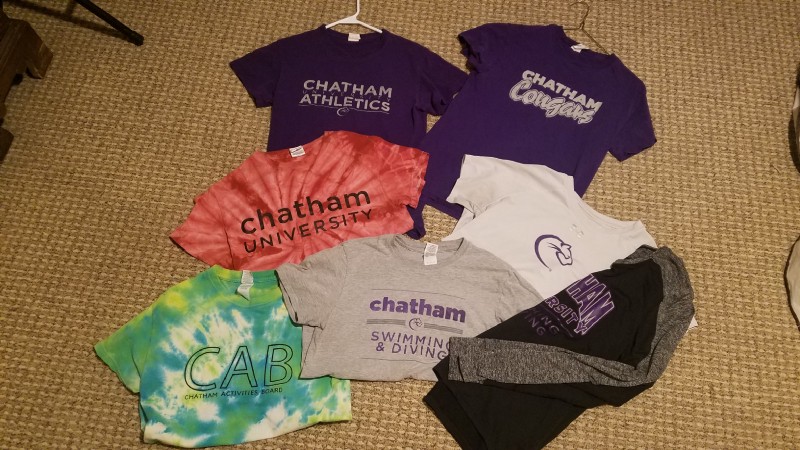Sustainability in question with so many Chatham T-shirts
December 2, 2019
Chatham University is the eighth most sustainable school in the country, according to BestColleges.com. This is based on statistics about its energy consumption, recycling and the low environmental impact of the Eden Hall campus in Gibsonia.
However, at times the school’s overall carbon footprint is questionable due to the amount of cheaply-produced free clothing given out by admissions, student affairs and the athletic departments.
Prospective students are bombarded by the admissions department with two things: sustainability icon and alumna Rachel Carson and a physical manifestation of the fast-fashion industry, free T-shirts. One of these things is not like the other. A school that prides itself on sustainability should be more conscious of such an avoidable problem.
Before I officially committed to Chatham, I had received four T-shirts from the admissions department. In my first week here, I was given another three. In my first year as a member of the swim team, I acquired six more from the athletic department. Over the course of my second year, I received eight. As of right now, I have a total of 21 T-shirts all of which were free, and none of which I actually wanted. I’m not even counting all the other cheap screen-printed sweatpants, shorts and hoodies Chatham has given me. If I did, the total would be well over 30.

I’ve met students that claim to have more than 60 T-shirts from Chatham and admit they rarely even wear them.
According to the admissions department website, as of Fall 2018 there were approximately 2,200 students at Chatham. If the average student has 12 T-shirts, that’s more than 25,000 T-shirts that will most likely end up in a landfill during the next 10 years.
Ironically, some of Chatham’s T-shirts brag about sustainability with quotes on the back like, “We don’t inherit the Earth from our ancestors, we borrow it from our children.”
Fourteen of my T-shirts are Gildan and the other seven are Hanes. Neither of these companies are particularly sustainable. Laws in the U.S. don’t say anything about chemicals in textile products sold here, but they do restrict how they are produced. According to truthout.com, “barely 3%” of textiles sold in the U.S. are made here. Instead they outsource cheap labor, with skimpy regulations in countries such as China and India because more chemicals are legal there.
Fashion is an extremely wasteful industry, one of which Chatham is contributing to greatly. Arguably, the worst part is that so many members of Chatham’s community boast about the University winning at sustainability. Sustainability isn’t supposed to be competitive. It’s a lifestyle one lives out in hope that the world will be cleaner and people will be happier. If this school truly cared about its carbon footprint more than it cared about advertising, we would stop buying, taking and wasting cheap T-shirts.
The next time you’re at a basketball game that’s giving out T-shirts or a club you’re in is considering purchasing them, think twice before you reach for another garment that will eventually end up in a landfill.
According to Global News, the fashion industry is the second largest polluter after oil. This isn’t surprising considering these statistics:
- The average T-shirt uses 400 to 600 gallons of water to produce.
- The fashion industry uses 1,600 chemicals in their dyeing processes 1% of which have been approved by the Environmental Protection Agency.
- A T-shirt can travel up to 3,500 km before it lands on a consumer’s back.
- People consume 400% more clothing today than they did 20 years ago.
- The average garment is only worn seven times before it is thrown out.







